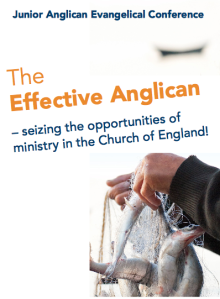Last week I had the pleasure of being part of the Junior Anglican Evangelical Conference 2014 (JAEC for short).

JAEC began as the idea of minister and writer John Richardson, a man who this last year went on to glory after a sudden brain tumour. A small group of us had first met as a conference back in 2011, with John sensing there was a need for young would-be ministers in the Church of England to benefit from a little more leadership and direction concerning their role in the C of E. His inspiration had been a 1945 C of E report called ‘Towards the Conversion of England’, which outlined a remarkable vision for bringing the good news of Jesus to the whole nation, as well as a “half-converted” Church.
Three years on, this was JAEC’s first year without John, yet his legacy very much lived on. Forty-something of us met together in Northamptonshire, a complete mix of those just beginning the ordination selection process, ordinands, curates, incumbents (i.e. vicars), and a few in lay leadership roles.

One of the highlights was having Bishop Keith Sinclair exposit the opening couple of chapters of 1 Peter, looking at the church’s call to holiness, both corporately and personally. He clearly spoke as one who had himself been nourished by the word of God, which is always a great encouragement when listening to a preacher. He challenged us to see how the word of God leads the people of God into obedience, which must in turn lead into love (1:22-23). But he also unpacked how the context for such love and obedience was a church that is distinct, noting how it can be easy for the Church to forget what it means to be in exile.
With the conference theme being ‘the effective Anglican’, we also had addresses from Lee Gatiss of Church Society on strategy and three excellent sessions looking at marriage, baptism, and death in the Church of England. These were rich in content, and also offered follow-up seminars that were full of practical dynamite for on-the-ground ministry.
Another excellent element of JAEC 2014, which is a big win in my book, was that it took the traditional meaning of ‘conference’ seriously, i.e. there was plenty of time for conversation. As well as the mix of various sessions (expositions, presentations and seminars), there was ample time to chat things through, ask for advice, and get to know others in similar (or dissimilar) situations. This means one has the fairly unique opportunity of listening, learning and dialoguing with those who are a few steps on from you, as well as encouraging those who are treading where you have already trod. The presence of various constituency leaders from sympathetic organisations strengthens the sense of this too.
Those I came with for whom it was their first JAEC seemed greatly encouraged by the two days. At a time where it feels like much guidance for young Anglican evangelicals is needed, it’s my experience that a forum such as JAEC is really valuable. For that, I give thanks to God for John Richardson’s initiative and heart to make it happen.